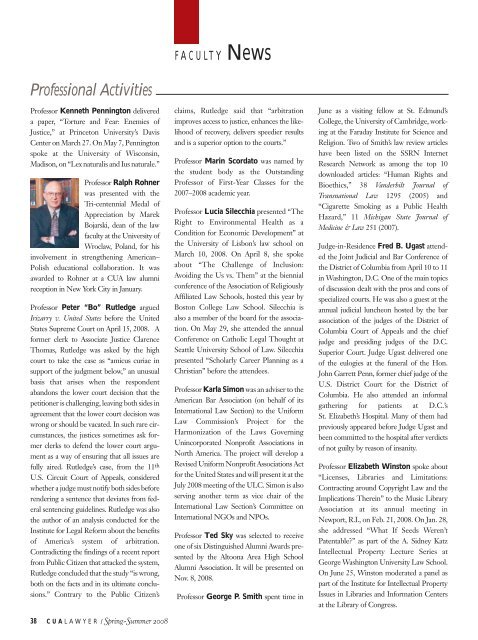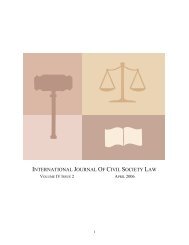Connected Minds,Connected Cultures:\ Connected Minds
Connected Minds,Connected Cultures:\ Connected Minds
Connected Minds,Connected Cultures:\ Connected Minds
- No tags were found...
You also want an ePaper? Increase the reach of your titles
YUMPU automatically turns print PDFs into web optimized ePapers that Google loves.
FACULTY NewsProfessional ActivitiesProfessor Kenneth Pennington delivereda paper, “Torture and Fear: Enemies ofJustice,” at Princeton University’s DavisCenter on March 27. On May 7, Penningtonspoke at the University of Wisconsin,Madison, on “Lex naturalis and Ius naturale.”Professor Ralph Rohnerwas presented with theTri-centennial Medal ofAppreciation by MarekBojarski, dean of the lawfaculty at the University ofWroclaw, Poland, for hisinvolvement in strengthening American–Polish educational collaboration. It wasawarded to Rohner at a CUA law alumnireception in New York City in January.Professor Peter “Bo” Rutledge arguedIrizarry v. United States before the UnitedStates Supreme Court on April 15, 2008. Aformer clerk to Associate Justice ClarenceThomas, Rutledge was asked by the highcourt to take the case as “amicus curiae insupport of the judgment below,” an unusualbasis that arises when the respondentabandons the lower court decision that thepetitioner is challenging, leaving both sides inagreement that the lower court decision waswrong or should be vacated. In such rare circumstances,the justices sometimes ask formerclerks to defend the lower court argumentas a way of ensuring that all issues arefully aired. Rutledge’s case, from the 11 thU.S. Circuit Court of Appeals, consideredwhether a judge must notify both sides beforerendering a sentence that deviates from federalsentencing guidelines. Rutledge was alsothe author of an analysis conducted for theInstitute for Legal Reform about the benefitsof America’s system of arbitration.Contradicting the findings of a recent reportfrom Public Citizen that attacked the system,Rutledge concluded that the study “is wrong,both on the facts and in its ultimate conclusions.”Contrary to the Public Citizen’sclaims, Rutledge said that “arbitrationimproves access to justice, enhances the likelihoodof recovery, delivers speedier resultsand is a superior option to the courts.”Professor Marin Scordato was named bythe student body as the OutstandingProfessor of First-Year Classes for the2007–2008 academic year.Professor Lucia Silecchia presented “TheRight to Environmental Health as aCondition for Economic Development” atthe University of Lisbon’s law school onMarch 10, 2008. On April 8, she spokeabout “The Challenge of Inclusion:Avoiding the Us vs. Them” at the biennialconference of the Association of ReligiouslyAffiliated Law Schools, hosted this year byBoston College Law School. Silecchia isalso a member of the board for the association.On May 29, she attended the annualConference on Catholic Legal Thought atSeattle University School of Law. Silecchiapresented “Scholarly Career Planning as aChristian” before the attendees.Professor Karla Simon was an adviser to theAmerican Bar Association (on behalf of itsInternational Law Section) to the UniformLaw Commission’s Project for theHarmonization of the Laws GoverningUnincorporated Nonprofit Associations inNorth America. The project will develop aRevised Uniform Nonprofit Associations Actfor the United States and will present it at theJuly 2008 meeting of the ULC. Simon is alsoserving another term as vice chair of theInternational Law Section’s Committee onInternational NGOs and NPOs.Professor Ted Sky was selected to receiveone of six Distinguished Alumni Awards presentedby the Altoona Area High SchoolAlumni Association. It will be presented onNov. 8, 2008.Professor George P. Smith spent time inJune as a visiting fellow at St. Edmund’sCollege, the University of Cambridge, workingat the Faraday Institute for Science andReligion. Two of Smith’s law review articleshave been listed on the SSRN InternetResearch Network as among the top 10downloaded articles: “Human Rights andBioethics,” 38 Vanderbilt Journal ofTransnational Law 1295 (2005) and“Cigarette Smoking as a Public HealthHazard,” 11 Michigan State Journal ofMedicine & Law 251 (2007).Judge-in-Residence Fred B. Ugast attendedthe Joint Judicial and Bar Conference ofthe District of Columbia from April 10 to 11in Washington, D.C. One of the main topicsof discussion dealt with the pros and cons ofspecialized courts. He was also a guest at theannual judicial luncheon hosted by the barassociation of the judges of the District ofColumbia Court of Appeals and the chiefjudge and presiding judges of the D.C.Superior Court. Judge Ugast delivered oneof the eulogies at the funeral of the Hon.John Garrett Penn, former chief judge of theU.S. District Court for the District ofColumbia. He also attended an informalgathering for patients at D.C.’sSt. Elizabeth’s Hospital. Many of them hadpreviously appeared before Judge Ugast andbeen committed to the hospital after verdictsof not guilty by reason of insanity.Professor Elizabeth Winston spoke about“Licenses, Libraries and Limitations:Contracting around Copyright Law and theImplications Therein” to the Music LibraryAssociation at its annual meeting inNewport, R.I., on Feb. 21, 2008. On Jan. 28,she addressed “What If Seeds Weren’tPatentable?” as part of the A. Sidney KatzIntellectual Property Lecture Series atGeorge Washington University Law School.On June 25, Winston moderated a panel aspart of the Institute for Intellectual PropertyIssues in Libraries and Information Centersat the Library of Congress.38CUALAWYER /Spring–Summer 2008
















